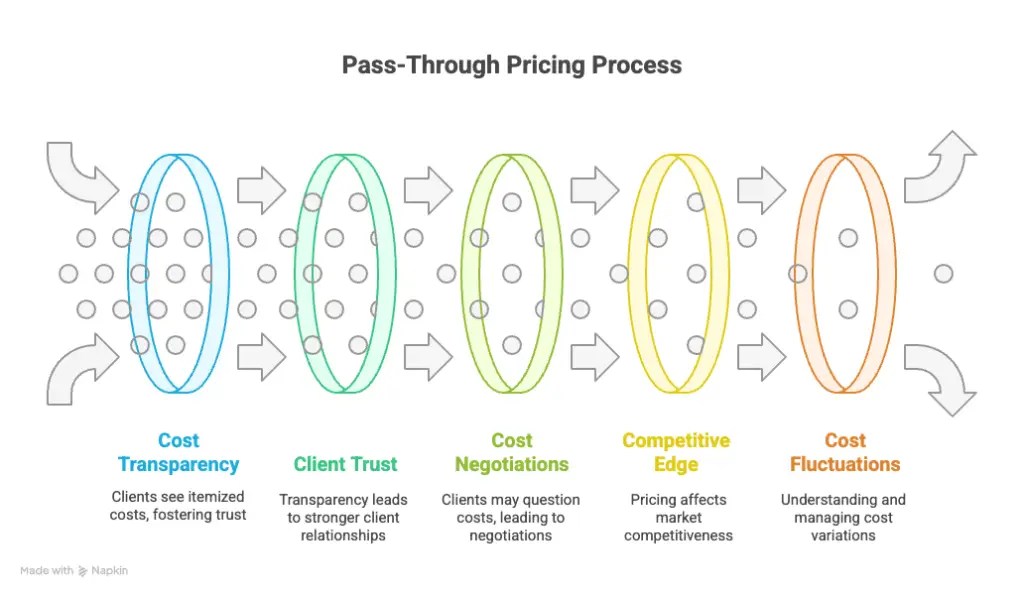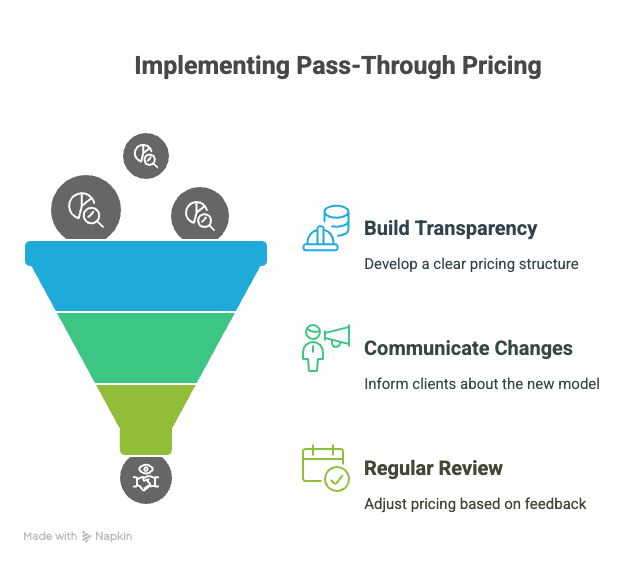In the recruitment and staffing industry, optimizing costs without compromising on quality is crucial. With the growing emphasis on thorough candidate screening, agencies are faced with the challenge of managing and sometimes monetizing screening costs. A key strategy here is the implementation of pass-through pricing models, allowing staffing firms to recover or even profit from their screening expenses.
In this guide, we'll explore various strategies and considerations for monetizing screening costs. From understanding key concepts in staffing screening pricing to aligning with legal frameworks like the FCRA, we'll cover everything you need to know to effectively manage and potentially monetize your screening expenditures.
Key Takeaways
- Strategic pricing helps staffing agencies cover screening costs and maintain profitability.
- Understanding the factors affecting screening expenses is crucial for managing your budget.
- Pass-through pricing offers transparency by directly charging clients for actual screening costs without markup.
- Clear communication and transparency in pricing foster trust and stronger client relationships.
- Regularly review and adjust your pricing strategy to stay competitive and compliant with legal standards.
Introduction
Staffing agencies often face a significant burden when it comes to screening costs. Background checks, credential verifications, and skill assessments all rack up expenses that can quickly add up. You know firsthand that skipping these checks isn't an option—it's essential to ensure candidates meet the standards of your clients. Yet, absorbing these costs without a plan can eat into your bottom line.
That's where strategic pricing becomes your ally. Crafting a pricing model that aligns with your expenses helps maintain profitability. This guide will offer you insights into monetizing these screening costs. We'll explore how to navigate the landscape of pass-through pricing, helping you offset expenditures effectively. By the end, you’ll have actionable strategies to manage costs while keeping your business competitive.
EXPERT INSIGHT: Let me share to you what I've learned from my experience in staffing: a sparkling resume isn't a surefire guarantee of a stellar hire. Screening is not distrust; it's the diligence we owe our profession. It is our protection, our safety shield that surrounds teams and clients and communities and safeguards them from unseen perils lurking behind on-paper profiles. By slowing down and checking and double-checking, we're sending a clear message—that every job matters and that people deserve the chance to work for those who've been considered thoughtfully. Let us consider it a badge of respect—for the job, for the client and for the individual who's earned the privilege. - Charm Paz, CHRP
Understanding Staffing Screening Costs
Staffing screening costs go beyond just running a background check. They encompass all the expenses incurred during the vetting process of potential employees. At its core, screening includes background checks and other assessments necessary to ascertain a candidate's suitability for a position. Background checks can range from criminal records and credit history to education verification and drug testing.
Several factors influence these costs. Industry standards play a large role, with sectors like healthcare or finance often requiring more comprehensive checks that naturally increase costs. The complexity of the screening needed is also a crucial factor. A simple criminal background check is less expensive than checking international credentials or conducting deep financial history investigations.
Typical expenses associated with these screenings include licensing fees used to access databases, and costs from third-party vendors who provide specific checks like drug testing. Knowing these components helps manage your budget and pricing to clients for these services, allowing you to align costs with your agency's financial goals.
Are you fully aware of how each factor could affect your screening budget? Understanding these nuances can make a significant difference in your bottom line.
Pass-Through Pricing Models
Pass-through pricing is a straightforward method where your agency transfers the actual costs of screening directly to your clients. In staffing, this model allows you to charge clients for the exact expenses you incur during background checks and other necessary screenings, without any added markup.
One of the main benefits of pass-through pricing is transparency. When clients see itemized costs, it builds trust and clarifies how much you invest in ensuring they receive thoroughly vetted candidates. This can lead to stronger client relationships, as clients appreciate the visibility into what they're paying for.
However, there are challenges to consider with pass-through pricing. For instance, clients may question the necessity or pricing of certain screenings, which could lead to negotiations or even disputes. To mitigate this, ensure you have detailed and clear invoicing that outlines why each screening is necessary and how it aligns with industry practices.
Think about how pass-through pricing might influence your competitive edge. While transparency is attractive, if your screenings are more extensive or costly than those of your competitors, you could be inadvertently pricing yourself out of the market. Regular benchmarking against industry standards can help keep your offerings competitive.
Lastly, consider any fluctuations in screening costs. Some months might see higher vendor fees due to demand or regulatory changes. Make sure your clients understand that these costs can vary and why they might. You might even set a threshold where you absorb minor cost variations, sharing larger fluctuations transparently.

Ask yourself: Are you ready to shift to pass-through pricing, and how will you communicate its benefits to your clients? Your approach could redefine how your agency operates and supports its clients.
Implementing Pass-Through Pricing in Staffing
Start with an honest review of your existing pricing and screening costs. List all the costs associated with your current screening processes. This includes background checks, drug tests, and any third-party verifications. Understanding these costs provides a clear basis for your pricing model.
Next, build a transparent pricing structure. Clear communication with clients around what each screening service costs helps foster trust. Break down costs for each element of the screening. This kind of transparency is crucial, particularly when clients are scrutinizing their spending.
Communicate changes directly and clearly with clients. Begin by explaining the rationale behind the shift to a pass-through model. Highlight how it benefits them—whether through transparency, predictable costs, or improved service. Keeping your clients informed avoids surprises and builds trust.
Regularly review and adjust your pricing models. Market conditions change, and so do client expectations. Regular feedback from both internal teams and clients will keep your pricing competitive and aligned with service value. Be open to changing the model if a particular approach isn't working as expected.

Implementing these steps ensures that your agency not only recovers screening costs but also maintains strong client relationships and stays competitive in the market.
Monetize Screening Costs Effectively
Think of enhancing your service offerings when you're aiming to justify the costs. Providing value-added services like detailed reporting or quicker turnaround times can give you an edge. Clients are often willing to pay a premium for services that save them time or improve efficiency.
Negotiating lower rates with your screening providers is another way to boost your margins. If you handle a large volume of checks, use that as leverage. Volume discounts are usually easier to secure, helping you better manage your expenditures.
Bundles can also attract more clients. Combine your screening services with other offerings to create compelling packages. This approach not only upsells your services but also makes them more appealing to clients looking for convenience and value.
Legal Considerations: FCRA and Pricing
Understanding the Fair Credit Reporting Act (FCRA) is essential for anyone dealing with employment screenings in the U.S. This federal law governs how information is collected and used in background checks, ensuring the privacy and fairness of the process. It impacts how you price and manage screening services.
Compliance with the FCRA is a must. You need to ensure clear authorization and disclosure processes. This means giving candidates a separate, standalone document that explains their rights and secures their written consent before conducting any checks. Ignoring this can lead to costly legal issues.
Aligning your pricing model with FCRA requirements helps maintain legal compliance. This involves clearly communicating costs to candidates and ensuring any charges align with the information provided under lawful terms. Transparent pricing not only builds trust but also reduces the risk of compliance errors.
For additional guidance, resources like the Department of Labor offer helpful insights. They provide up-to-date information on legislation and compliance measures which can be valuable in structuring your screening pricing models effectively.
Resources
Building on your knowledge and strategies is crucial for staying ahead. Internally, you can explore our guide on most common background check questions. This resource will reinforce your understanding of screening intricacies.
For a broader perspective on hiring regulations and industry trends, consider external resources. The Department of Labor offers valuable information to help you navigate complex legal landscapes in employment and screening practices.
Using both internal and external resources will ensure you have a well-rounded approach to managing screening costs effectively.
Conclusion
Effective monetization of screening costs hinges on a well-considered pricing strategy. A clear, strategic approach to pricing can significantly contribute to a staffing agency's profitability and long-term sustainability. By implementing pass-through pricing models, your agency can transparently manage screening expenses while maintaining competitive service offerings.
Adapting and evolving your pricing strategy is not a one-time task. It requires you to stay informed about industry trends, client expectations, and legal frameworks like the FCRA. Regularly reassessing and fine-tuning your approach allows your agency to respond dynamically to market demands and regulatory changes, ensuring continued growth and compliance.
Key takeaways from this guide focus on thorough understanding and application. Prioritize clarity in client communication, ensure legal compliance in every pricing model, and consider value-added services to enhance competitiveness. By adopting these strategies, your agency can effectively monetize screening costs and potentially improve its financial standing.
Prepare your agency to embrace this strategic shift by understanding the full scope of your costs and implementing thoughtful pricing models that do more than just cover expenses—they position you for future success.
Frequently Asked Questions (FAQs)
What is pass-through pricing in staffing?
Pass-through pricing refers to charging clients for expenses incurred during the staffing process on an at-cost basis. This includes costs like background checks, where the staffing agency does not mark up the price but passes the exact expense to the client.
Can staffing agencies charge candidates for background checks?
Typically, staffing agencies cannot charge candidates for background checks. The cost is usually covered by the agency or passed on to the client.
How do you recover background screening costs?
You can recover these costs by including them in the service fees charged to the client or listing them as a separate line item on the client's invoice. The approach should be clearly outlined in the contract.
Is it legal to mark up background check prices?
Marking up background check prices can be legal but may raise ethical concerns. Transparency with clients about any markups is crucial to maintain trust and clarity.
What are the best practices for billing screening costs to clients?
Include screening costs as itemized on the invoice. Provide documentation or receipts to support these costs. Ensure your client agrees to this billing practice in the initial service agreement.
What should you include in a staffing contract regarding screening costs?
Specify who bears the cost of background checks and other screenings. Detail how and when these costs will be billed. Clearly outline any markups applied.
How can you maintain transparency with clients about screening costs?
Always provide detailed invoices with line items for each expense. Offer to share original receipts or documentation. Communicate openly about cost changes or adjustments.
Are there alternatives to direct billing for screening costs?
Yes, some agencies choose to incorporate these costs into the overall service rate, ensuring the client understands this is a bundled service. This method can simplify billing but must be communicated upfront.
Why is it crucial to agree on screening cost handling before starting a contract?
It prevents misunderstandings and disputes over billing. Having a clear agreement ensures both parties are aware of their financial responsibilities from the onset.
Definitions
Background Check
A background check is the process of verifying a candidate’s history to ensure they are suitable for a job. It can include reviewing criminal records, employment history, credit reports, and education. Many staffing agencies use third-party vendors for this service. For example, a healthcare client may require a thorough criminal check and license verification before hiring a nurse.
Credential Verification
Credential verification confirms that candidates hold the degrees, certifications, or licenses they claim. This step protects clients from hiring individuals with false qualifications. If your agency staffs teachers, you might verify each candidate's teaching license through the state’s education board. Missing this step could lead to compliance issues for your client.
Skill Assessment
Skill assessments measure a candidate’s ability to perform tasks relevant to the job. These tests can be technical, role-specific, or general cognitive evaluations. In tech recruiting, for example, a coding test could verify a developer’s programming proficiency. These results help filter candidates who are not a good fit before your client interviews them.
Pass-Through Pricing
Pass-through pricing means charging your client the exact cost you pay for screenings like background checks or drug tests. You don’t mark up the cost. This pricing method promotes transparency and aligns your billing with actual expenses. If a drug test costs $45 from your vendor, your client is billed the same amount.
Fair Credit Reporting Act (FCRA)
The FCRA is a federal law that regulates how background checks are conducted and shared in hiring. It requires you to get clear authorization from the candidate before running any report and to notify them if a hiring decision is based on their report. Failing to follow FCRA rules can lead to legal penalties. Always provide the required disclosure documents and keep records.

GCheck Editorial Team
Meet the GCheck Editorial Team, your trusted source for insightful and up-to-date information in the world of employment background checks. Committed to delivering the latest trends, best practices, and industry insights, our team is dedicated to keeping you informed.
With a passion for ensuring accuracy, compliance, and efficiency in background screening, we are your go-to experts in the field. Stay tuned for our comprehensive articles, guides, and analysis, designed to empower businesses and individuals with the knowledge they need to make informed decisions.
At GCheck, we're here to guide you through the complexities of background checks, every step of the way.






